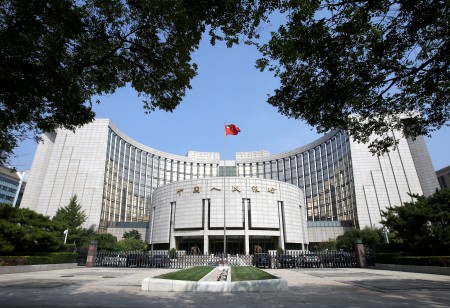BEIJING (Reuters) – China’s central bank will seek to “enrich” its monetary policy toolbox and will gradually increase buying and selling of treasury bonds in its open market operations, its second-quarter monetary policy implementation report said on Friday.
The People’s Bank of China (PBOC) will also seek to steadily lower companies’ financing and household credit costs, the report said, adding that prudent monetary policy should be “flexible, moderate, precise and effective.”
The PBOC will “guide credit to grow reasonably and balance the supply of credit while keeping liquidity reasonably ample,” said the report.
The central bank will pay attention to changes in long-term bond yields during economic recovery and said it will conduct stress tests on the risk exposures of bond assets held by financial institutions and prevent interest rate risks.
“It’s necessary to enrich the monetary policy toolbox, enrich and improve methods of monetary base injection, and gradually increase buying and selling of government bonds in the central bank’s open market operations,” the PBOC said.
The central bank will pay close attention to changes in the monetary policies of major overseas central banks, it added.
China’s economic growth missed forecasts in the second quarter, depressed by a property downturn and sluggish domestic demand, while some July economic indicators showed a mixed and unbalanced recovery.
The PBOC will also study plans to appropriately narrow its interest rate corridor and deliver clearer signals of interest rates adjustments to markets. The central bank last month launched temporary repo or reverse repos to make open market operations more efficient and keep the banking system liquidity ample.
On the Chinese yuan, the PBOC vowed it will prevent the formation and self-reinforcement of unilateral expectations and will guard against risk of exchange rate overshooting.
The yuan is up 0.7% against the dollar this month, in tandem with a surging Japanese yen, as an unwinding of short positions snowballed following a surprise rate hike by the Bank of Japan and weakness in U.S. economic indicators.
To achieve a stable and sound development of the property sector, the PBOC said it will step up support to construction and seek to boost supplies of affordable housing.
Keeping prices stable and ensuring moderate inflation will still be a significant consideration of the bank’s monetary policy, the bank said, adding it will keep prices at a “reasonable level.”
China’s consumer prices rose at a slightly faster-than-expected rate in July, partly due to weather disruptions in food supplies, while producer deflation persisted, official data showed on Friday.
(Reporting by Ellen Zhang and Kevin Yao; Editing by David Holmes)






